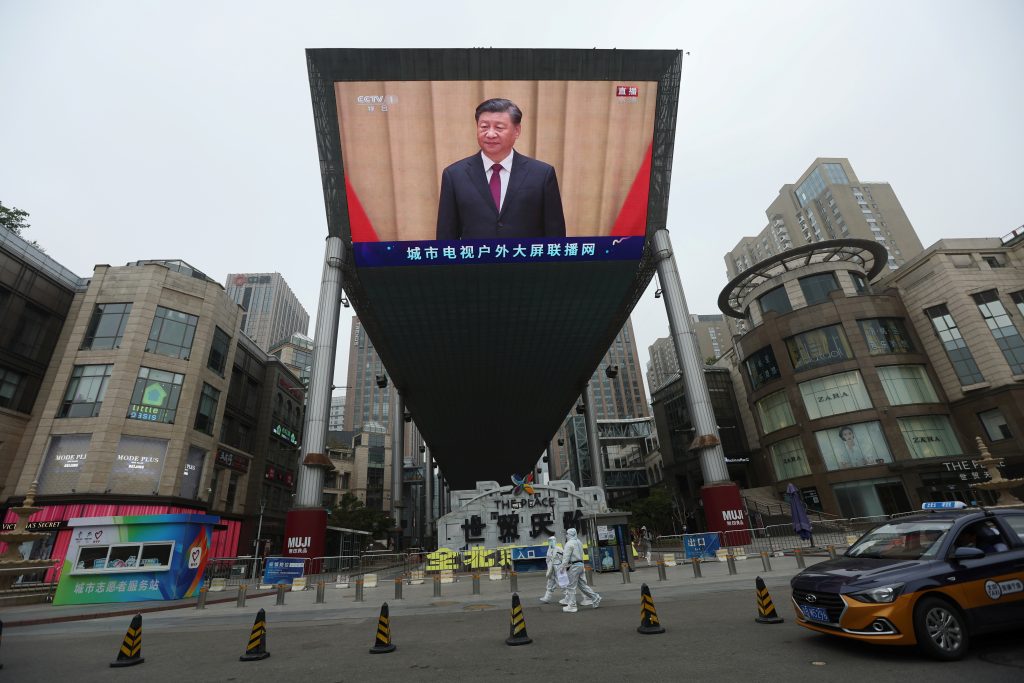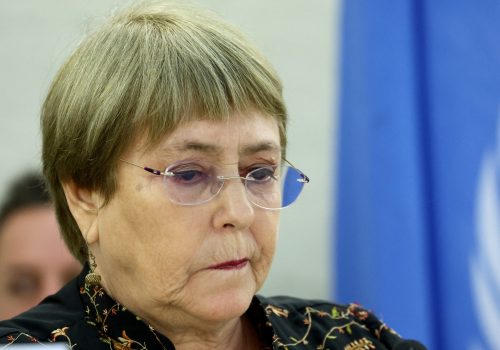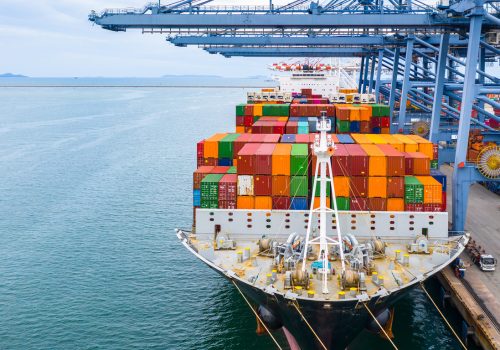For Chinese President Xi Jinping, dispatching his special envoy to Europe for a three-week charm tour was just one of many acts of high-stakes damage control ahead of the Twentieth Chinese Communist Party Congress this autumn.
Xi’s economy is dangerously slowing, financing for his Belt and Road Initiative has tanked, his zero-Covid policy is flailing, and his continued support of Russian President Vladimir Putin hangs like a cloud over his claim of being the world’s premier national-sovereignty champion as Russia’s war on Ukraine grinds on.
Few China watchers believe Xi’s hold on power faces any serious challenge, but that’s hard to rule out entirely given how many recent mistakes he’s made. So, Xi’s taking no chances ahead of one of his party’s most important gatherings, a meeting designed to assure his continued rule and his place in history.
European business leaders understood that as the context for their recent meetings with Wu Hongbo, the special representative of the Chinese government for European affairs and former UN undersecretary general. His message was a similar one at every stop: Belgium, Cyprus, the Czech Republic, France, Hungary, Germany, and Italy.
“The Chinese want to change the tone of the story, to control the damage,” said one European business leader who asked to remain anonymous due to his Chinese business interests. “They understand they have gone too far.”
The businessman described Wu, with his fluent and fluid English, as one of the smoothest, most open, and intellectually nimble Chinese officials he’s met. At every stop, Wu conceded China had “made mistakes,” from its handling of Covid-19, to its “wolf warrior” diplomacy, to its economic mismanagement.
His trip came as concerns in China have grown about “losing Europe” in the wake of Putin’s invasion of Ukraine.
The public mood has shifted sufficiently to have Finland and Sweden knocking on NATO’s door, and the European Union this week embracing the prospect of Ukraine’s membership candidacy. Wu’s visit was also something of a mop-up operation following a failed visit by Chinese official Huo Yuzhen to eight central and east European countries. In Poland, he was refused a meeting with government officials.
Germans and their political leaders—Europe’s most significant target for Chinese diplomats and business—are raising new questions about everything from investment guarantees for German business in China to specific projects like VW’s factory in Xinjiang province, home of human rights abuses against the primarily Muslim Uyghur population.
Though Wu addressed Putin’s war in Ukraine only indirectly, his message was designed to reassure Europeans that they are preferred partners, as opposed to the United States. His bottom line: China will always be China, a country of growing significance and economic opportunities for Europe.
Yet lost ground in Europe is just one of many gathering problems Xi faces ahead of his party congress, which will determine the country’s economic, foreign policy and domestic agenda for years to come.
At the same time, China and Xi continue to have a strong reputation and influence in much of the rest of the world. Even with Belt and Road financing slowing, China remains ascendant in the Global South, where the United States has been less focused or, in places, isn’t present at all.
Also, the party congress is likely to provide Xi a third term and even more internal party power, a move that follows a 2018 decision to scrap term limits. China watchers will be waiting to see whether Xi can continue to put his allies in key party positions, but thus far there aren’t any signs he won’t be able to do so.
However the Congress turns out, there is still growing talk among China experts about whether we are entering a period of “Peak Xi” or even “Peak China.” There’s growing evidence that he and the country he represents (and his approach has been to make the two inseparable) have reached the height of their influence and reputation, at least in Europe and as a steadily growing economic juggernaut.
Nothing will determine the outcome more than how Xi manages China’s economy, which is the foundation for the country’s far-reaching global influence as well as the Communist party’s domestic legitimacy.
Former Australian Prime Minister Kevin Rudd, one of the keenest China watchers anywhere, sees China’s economic prospects weakening due to a chain of factors. They include at least ten Chinese property developer defaults and Xi’s crackdown on China’s technology sector, which has cost it $2 trillion in market capitalization of its ten biggest tech companies over the past year.
Moreover, Putin’s invasion of Ukraine has sent energy and commodity prices soaring and has snarled supply chains, “terrible news for the world’s largest manufacturer, exporter and energy-consuming economy,” Rudd wrote recently in The Wall Street Journal. Add to this Xi’s insistence on China’s Zero Covid strategy, which led to mass lockdowns.
Rudd concludes that this combination of factors is enough to make Xi miss his 5.5 percent growth target and perhaps even grow more slowly this year than the United States. “For Mr. Xi, failing to reach the target would be politically disastrous,” writes Rudd.
Xi’s damage control on the economic front has included fiscal and monetary stimulus and infrastructure spending to grow domestic demand. A recent meeting of the Politburo also suggested some coming relief from the regulatory crackdown on China’s tech sector.
Yet none of that will be enough to reverse Xi’s cardinal sin, and that was his dramatic pivot to stronger state and party controls.
Writing in Foreign Affairs, the Atlantic Council’s Daniel H. Rosen, who is a founding partner of Rhodium Group, argues, “China cannot have both today’s statism and yesterday’s strong growth rates. It will have to choose.”
Adds Craig Singleton this week in Foreign Policy, “China’s fizzling economic miracle may soon undercut the (Communist party’s) ability to wage a sustained struggle for geostrategic dominance.”
There’s not much time left for damage control before Xi opens his party Congress in the Great Hall of the People. He’s likely to get the outcome he wants sealed long before the Congress, but that won’t solve the larger problem. It has been his leadership and decision-making that have generated China’s challenges, and he’ll have to correct course if he is to restore economic growth at home, revive his international momentum and avoid “Peak Xi.”
This article originally appeared on CNBC.com
Frederick Kempe is president and chief executive officer of the Atlantic Council. You can follow him on Twitter @FredKempe.
THE WEEK’S TOP READS
#1 What Returning to China Taught Me About China
Michael Schuman | THE ATLANTIC
Long-time readers of Inflection Points know I’m a big fan of the Michael Schuman’s reporting on China.
This time Schuman, a nonresident senior fellow at the Atlantic Council, serves up a personal account of the arbitrary and bizarre world Xi’s zero-COVID policy has created in China, full of long, solitary confinements and mountains of paperwork. Schuman writes that he was separated from his wife after the Chinese government denied his visa and he left Beijing for Hong Kong in 2020. What followed was a 662-day odyssey before he saw his wife again.
“This zero-COVID policy is not an aberration,” Schuman writes. “It is representative of China’s political and social system. Authoritarian rule, by its very nature, must be arbitrary. Anything else would require the state to be held accountable for its failings and actions, and that would be intolerable here. The knock on the door must be able to come at any moment—and too often does—for something written, said, read, or done that the state doesn’t like. The consequence, by design, is a society that lives in a constant atmosphere of trepidation and helplessness.” Read more →
#2 The U.S. overestimated Russia’s military might. Is it underestimating China’s?
Nahal Toosi and Lara Seligman | POLITICO
Nahal Toosi and Lara Seligman powerfully highlight the difficulty of gleaning accurate intelligence about China’s military ability and aims–and why that matters.
“Growing U.S. worries,” they write, “that China will sooner rather than later attack Taiwan as part of a broader effort to eclipse American power in the Pacific make the topic of Beijing’s military prowess more salient than ever, said lawmakers and eight current and former officials interviewed for this story. The concerns about a lack of U.S. understanding of China’s military are compounded by the fact that the People’s Liberation Army has not fought in a war in more than 40 years.”
The authors add, “Beyond military capability, American officials have limited insight into the inner workings of China’s communist leadership, how security-related decisions are made, and what moves could trigger what responses.”
Read this for an excellent analysis of what the United States doesn’t (but should) know. Read more →
#3 Has China Lost Europe?
Ian Johnson | FOREIGN AFFAIRS
One notable casualty of Xi’s friendship with Putin has been China’s initiatives in central and eastern Europe. As my former Wall Street Journal colleague Ian Johnson writes, China has long courted central and eastern European countries, only to watch those gains vanish in the face of China’s undelivered promises and China’s de facto support of Putin’s war in Ukraine.
“China’s failures in central and eastern Europe,” Johnson writes, “highlight the country’s increasingly ideological approach to foreign affairs under Xi Jinping. Most of these failures were self-inflicted. China has long been suspicious of Western alliances, such as NATO, but its decision to openly endorse the Russian position went a step further, essentially telling countries in the 16+1 to abandon one of their key foreign-policy priorities. People in the Chinese foreign policy establishment must have recognized how badly this would play in the region, but they were apparently unable to sway the Chinese leadership. Instead, Xi’s desire to strike a deal with Russian President Vladimir Putin, with whom he has strong personal relations, won out. This behavior is part of an overall of China’s foreign-policy experts in favor of ideologues closer to Xi.” Read more →
#4 China’s Lessons From Russia’s War
Kevin Rudd | PROJECT SYNDICATE
Former Australian Prime Minister Kevin Rudd, one of the smartest China watchers writing tFormer Australian Prime Minister Kevin Rudd offers this must-read analysis of Xi’s calculation’s regarding a potential invasion of Taiwan.
Far from being deterred by Russia’s failures, Rudd argues, “the Chinese will watch what happens in Ukraine with an eye toward avoiding Putin’s mistakes, and with a deep confidence that China can and will do better. Of course, the danger for Xi is that such confidence could ultimately prove as delusional as Putin’s belief that he would conquer Ukraine in a matter of days.”
Therefore, Rudd concludes, it is imperative that the United States, Taiwan, and their allies build up “effective levels of deterrence, so that when Xi’s preferred timetable reaches its moment of decision, the PLA will have no choice but to advise him that the military risks are still too great to launch an invasion.”
If Ukraine offers lessons, it’s that it is better to prevent war through unmistakable deterrence than risk conflict through wishful thinking. Read more →
#5 Ukraine could be an inflection point for the West
Andrew A. Michta | POLITICO EUROPE
Andrew Michta, one of the top experts on NATO and transatlantic security, offers this important warning about the need to continue giving Ukraine as much aid as possible, and the dangers of a negotiated peace.
“Let’s first consider the consequences of Ukraine’s defeat,” Michta writes. “At this stage, any ceasefire would allow Putin to hold on to conquered territory, and the remaining Ukrainian rump state — bereft of its industrial basin in the east and with Russia’s continued Black Sea blockade — would be unable to sustain itself economically. More importantly, in a few years, Putin would regroup, rebuild his military and be able to launch another round of conquest to seize all of Ukraine — especially if the ceasefire deal included lifting sanctions on Western imports critical to his weapons production.”
If, on the other hand, Russia is driven out and Ukraine is restored, “With its vast array of natural resources and as one of the richest agricultural lands on earth, a rebuilt Ukraine — restored not as a post-Soviet state but as a thriving democratic polity and closely integrated into Europe’s economy — would fundamentally change the power dynamics both in Europe and globally.”
Michta sums things up: “Let’s have the courage to help Ukraine win.” Read more →
Atlantic Council top reads
Image: Medical workers in protective suits walks past a giant screen showing Chinese President Xi Jinping at an event celebrating the 100th anniversary of the founding of the Chinese Communist Youth League, amid the coronavirus disease (COVID-19) outbreak in Beijing, China May 10, 2022. REUTERS/Tingshu Wang



